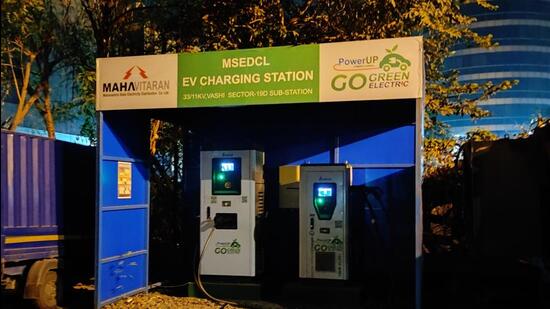Our Terms & Conditions | Our Privacy Policy
‘70% of India’s charging demand for e-trucks by 2030 from Maha, UP, Raj, Guj, MP’ | Latest News Delhi
Maharashtra, Uttar Pradesh, Rajasthan, Gujarat and Madhya Pradesh are together expected to account for more than 70% of India’s charging demand for electric trucks (e-trucks) by 2030, according to new study released by the International Council on Clean Transportation (ICCT) on Monday.
An EV charging stations in Navi Mumbai. (HT PHOTO)
The study, launched at the Indian Clean Transportation Summit (ICTS) 2025, estimates that meeting the projected demand from electric trucks will require a charging capacity of 9 gigawatts (GW) by the end of the decade – five times the current power generation capacity of Delhi. By 2030, the network will have to support around 1.3 lakh battery-operated trucks on Indian roads, it said.
The report said these five states sit along key freight corridors such as the Golden Quadrilateral, and the Delhi–Mumbai and Eastern Dedicated Freight Corridors, making them priority hubs for early infrastructure planning and investments.
“As India prepares for the transition to electric trucks, building robust charging infrastructure must be a top priority. Without reliable and strategically placed charging networks along freight corridors, the adoption of electric trucks will face unnecessary roadblocks,” said Amit Bhatt, India Managing Director, ICCT.
The report points out that India’s 2070 net-zero target will require 100% zero-emission truck sales by 2050. High-power charging stations along logistics hubs will be crucial to meet this goal. ICCT recommends four key steps for policymakers: develop national and state-level charging roadmaps, coordinate grid planning, bridge data gaps on freight movement, and integrate charging into logistics frameworks.
The report was launched by Dr. Hanif Qureshi, Additional Secretary, Ministry of Heavy Industries in presence of members from ICCT and the Norway Embassy. Qureshi said the government was focused on steering clean freight through policy reforms and financing strategies.
“Manufacturing is fast emerging as a key strength of India’s automotive sector, especially in advanced technologies like batteries. The Ministry of Heavy Industries is committed to enabling this transition through policy support and demand incentives,” he said.
Drew Kodjak, ICCT President and CEO, said India can position itself as a frontrunner in clean freight, driving both economic growth and emissions reduction.
Experts meanwhile called for demand creation for e-trucks. N Mohan, Head EVCI, CESL said while e-buses now had a defined ecosystem, for e-trucks, the ecosystem was still more fragmented. “There needs to be a demand for manufacturing. At present, it is still a ‘made-to-demand’ concept. It is time for the government to now create a demand for the same,” he said, while speaking on a session “role of the private sector in accelerating e-trucks adoption”.
Manekdeep Singh, Co-founder, ChargeCity – also speaking at the same session, called for the creation of adequate EV charging infrastructure in a phased manner, in order to facilitate usage of e-trucks.
“We need to start with creation of this infrastructure for cement and steel industries, where e-trucks need to travel only around 250-300 kms. There, the infra can be created at the plants itself. Then, we need to target charging points along shorter highway route, for instance Delhi to Jaipur or Chandigarh, before gradually targetting longer routes like Delhi Mumbai,” he said, starting they while vacant land next to fuelling stations would be ideal to create EV charging points on highways, dhabas were another great option. “One requires power between 1-3 MW, which should be enough to charge between 10 to 12 trucks at a time,” he added.
Images are for reference only.Images and contents gathered automatic from google or 3rd party sources.All rights on the images and contents are with their legal original owners.



Comments are closed.